Accounting Theory and Corporate Governance: NAB and HostPlus Report
VerifiedAdded on 2022/11/25
|10
|2429
|111
Report
AI Summary
This report provides a comprehensive analysis of accounting theory and corporate governance, focusing on the Australian context. It examines the corporate governance practices of NAB and HostPlus, exploring their board compositions, strategic visions, and adherence to corporate governance principles. The report delves into the failure of corporate governance by NAB, discussing the HomeSide US Loans issue, the role of ASIC, and the impact of CLERP 9 on auditor independence. Furthermore, it explores integrated reporting and its significance in enhancing transparency and accountability. The report utilizes recent annual financial reports to provide a detailed overview of the subject matter, offering insights into corporate misconduct, financial reporting, and the evolution of accounting practices. The report also highlights the importance of ethical business behavior and the need for ongoing research to address emerging issues in corporate governance and accounting.
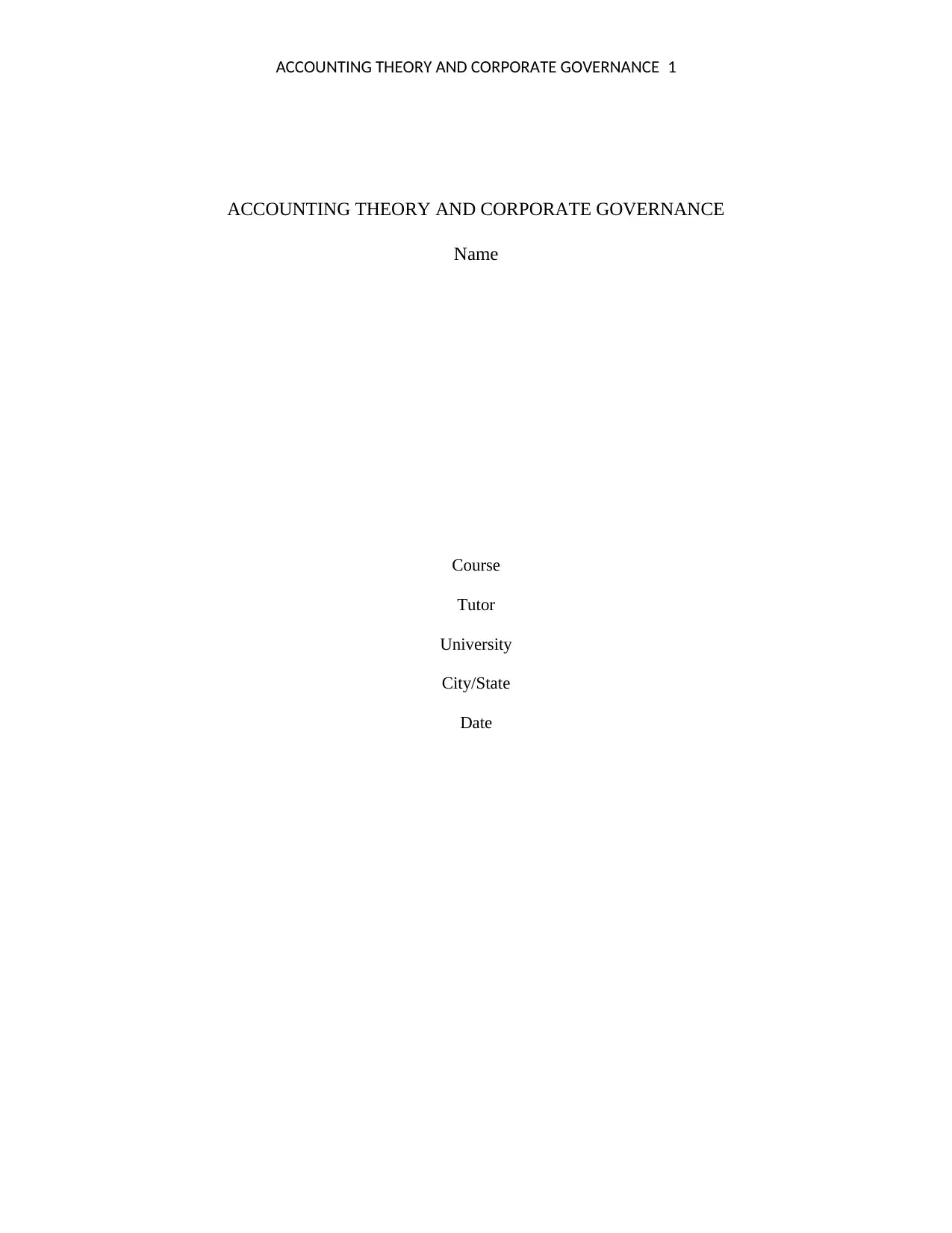
ACCOUNTING THEORY AND CORPORATE GOVERNANCE 1
ACCOUNTING THEORY AND CORPORATE GOVERNANCE
Name
Course
Tutor
University
City/State
Date
ACCOUNTING THEORY AND CORPORATE GOVERNANCE
Name
Course
Tutor
University
City/State
Date
Paraphrase This Document
Need a fresh take? Get an instant paraphrase of this document with our AI Paraphraser
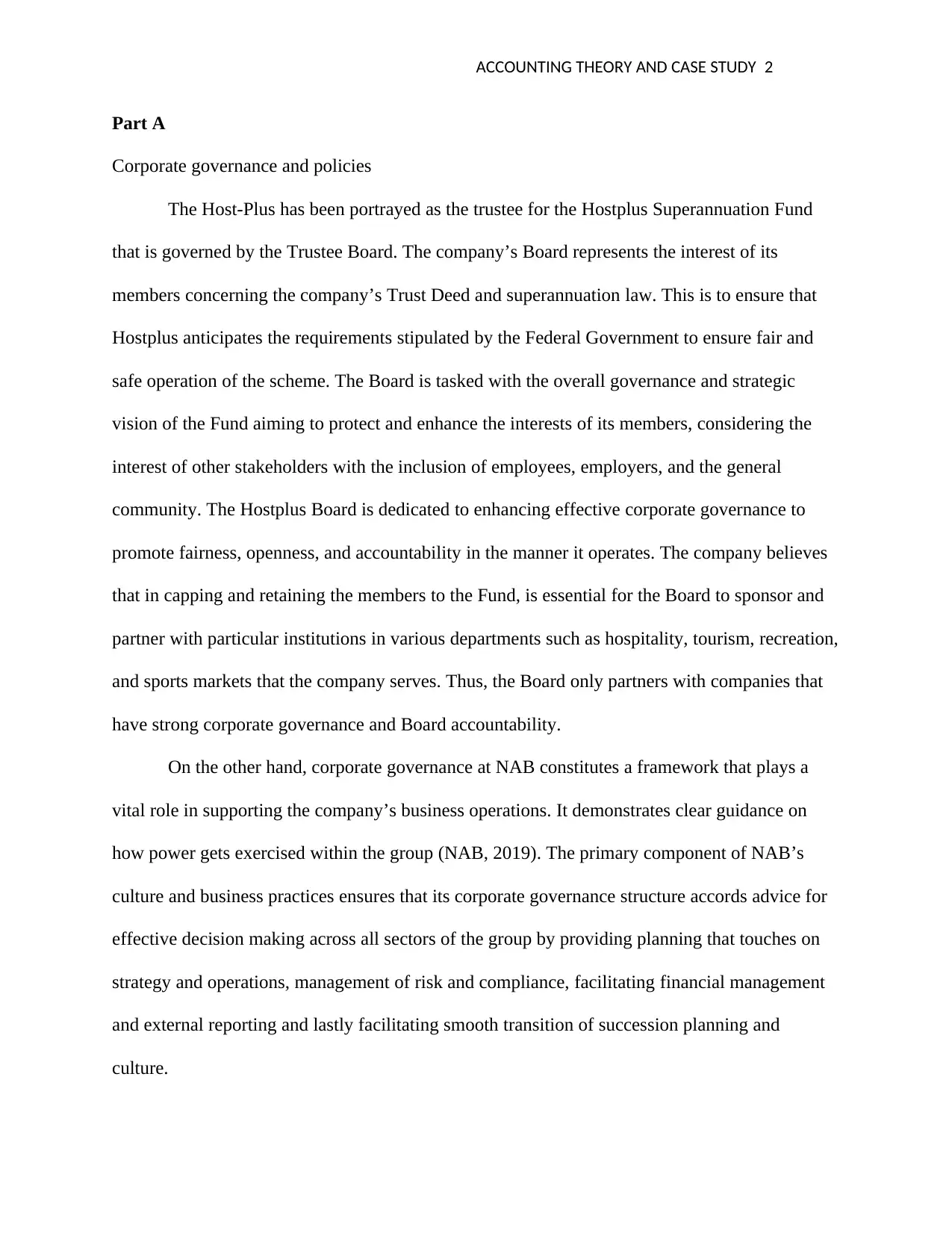
ACCOUNTING THEORY AND CASE STUDY 2
Part A
Corporate governance and policies
The Host-Plus has been portrayed as the trustee for the Hostplus Superannuation Fund
that is governed by the Trustee Board. The company’s Board represents the interest of its
members concerning the company’s Trust Deed and superannuation law. This is to ensure that
Hostplus anticipates the requirements stipulated by the Federal Government to ensure fair and
safe operation of the scheme. The Board is tasked with the overall governance and strategic
vision of the Fund aiming to protect and enhance the interests of its members, considering the
interest of other stakeholders with the inclusion of employees, employers, and the general
community. The Hostplus Board is dedicated to enhancing effective corporate governance to
promote fairness, openness, and accountability in the manner it operates. The company believes
that in capping and retaining the members to the Fund, is essential for the Board to sponsor and
partner with particular institutions in various departments such as hospitality, tourism, recreation,
and sports markets that the company serves. Thus, the Board only partners with companies that
have strong corporate governance and Board accountability.
On the other hand, corporate governance at NAB constitutes a framework that plays a
vital role in supporting the company’s business operations. It demonstrates clear guidance on
how power gets exercised within the group (NAB, 2019). The primary component of NAB’s
culture and business practices ensures that its corporate governance structure accords advice for
effective decision making across all sectors of the group by providing planning that touches on
strategy and operations, management of risk and compliance, facilitating financial management
and external reporting and lastly facilitating smooth transition of succession planning and
culture.
Part A
Corporate governance and policies
The Host-Plus has been portrayed as the trustee for the Hostplus Superannuation Fund
that is governed by the Trustee Board. The company’s Board represents the interest of its
members concerning the company’s Trust Deed and superannuation law. This is to ensure that
Hostplus anticipates the requirements stipulated by the Federal Government to ensure fair and
safe operation of the scheme. The Board is tasked with the overall governance and strategic
vision of the Fund aiming to protect and enhance the interests of its members, considering the
interest of other stakeholders with the inclusion of employees, employers, and the general
community. The Hostplus Board is dedicated to enhancing effective corporate governance to
promote fairness, openness, and accountability in the manner it operates. The company believes
that in capping and retaining the members to the Fund, is essential for the Board to sponsor and
partner with particular institutions in various departments such as hospitality, tourism, recreation,
and sports markets that the company serves. Thus, the Board only partners with companies that
have strong corporate governance and Board accountability.
On the other hand, corporate governance at NAB constitutes a framework that plays a
vital role in supporting the company’s business operations. It demonstrates clear guidance on
how power gets exercised within the group (NAB, 2019). The primary component of NAB’s
culture and business practices ensures that its corporate governance structure accords advice for
effective decision making across all sectors of the group by providing planning that touches on
strategy and operations, management of risk and compliance, facilitating financial management
and external reporting and lastly facilitating smooth transition of succession planning and
culture.
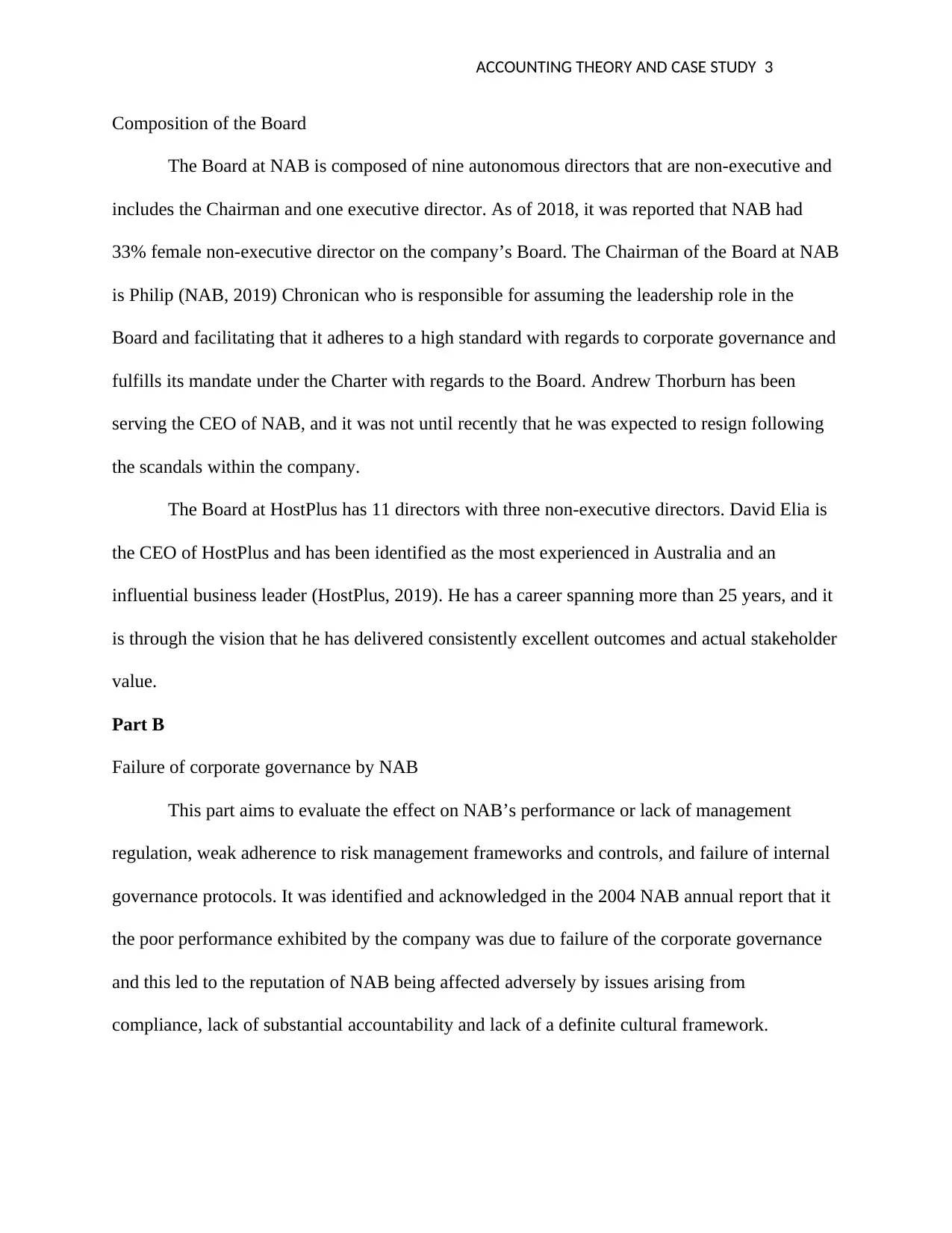
ACCOUNTING THEORY AND CASE STUDY 3
Composition of the Board
The Board at NAB is composed of nine autonomous directors that are non-executive and
includes the Chairman and one executive director. As of 2018, it was reported that NAB had
33% female non-executive director on the company’s Board. The Chairman of the Board at NAB
is Philip (NAB, 2019) Chronican who is responsible for assuming the leadership role in the
Board and facilitating that it adheres to a high standard with regards to corporate governance and
fulfills its mandate under the Charter with regards to the Board. Andrew Thorburn has been
serving the CEO of NAB, and it was not until recently that he was expected to resign following
the scandals within the company.
The Board at HostPlus has 11 directors with three non-executive directors. David Elia is
the CEO of HostPlus and has been identified as the most experienced in Australia and an
influential business leader (HostPlus, 2019). He has a career spanning more than 25 years, and it
is through the vision that he has delivered consistently excellent outcomes and actual stakeholder
value.
Part B
Failure of corporate governance by NAB
This part aims to evaluate the effect on NAB’s performance or lack of management
regulation, weak adherence to risk management frameworks and controls, and failure of internal
governance protocols. It was identified and acknowledged in the 2004 NAB annual report that it
the poor performance exhibited by the company was due to failure of the corporate governance
and this led to the reputation of NAB being affected adversely by issues arising from
compliance, lack of substantial accountability and lack of a definite cultural framework.
Composition of the Board
The Board at NAB is composed of nine autonomous directors that are non-executive and
includes the Chairman and one executive director. As of 2018, it was reported that NAB had
33% female non-executive director on the company’s Board. The Chairman of the Board at NAB
is Philip (NAB, 2019) Chronican who is responsible for assuming the leadership role in the
Board and facilitating that it adheres to a high standard with regards to corporate governance and
fulfills its mandate under the Charter with regards to the Board. Andrew Thorburn has been
serving the CEO of NAB, and it was not until recently that he was expected to resign following
the scandals within the company.
The Board at HostPlus has 11 directors with three non-executive directors. David Elia is
the CEO of HostPlus and has been identified as the most experienced in Australia and an
influential business leader (HostPlus, 2019). He has a career spanning more than 25 years, and it
is through the vision that he has delivered consistently excellent outcomes and actual stakeholder
value.
Part B
Failure of corporate governance by NAB
This part aims to evaluate the effect on NAB’s performance or lack of management
regulation, weak adherence to risk management frameworks and controls, and failure of internal
governance protocols. It was identified and acknowledged in the 2004 NAB annual report that it
the poor performance exhibited by the company was due to failure of the corporate governance
and this led to the reputation of NAB being affected adversely by issues arising from
compliance, lack of substantial accountability and lack of a definite cultural framework.
⊘ This is a preview!⊘
Do you want full access?
Subscribe today to unlock all pages.

Trusted by 1+ million students worldwide
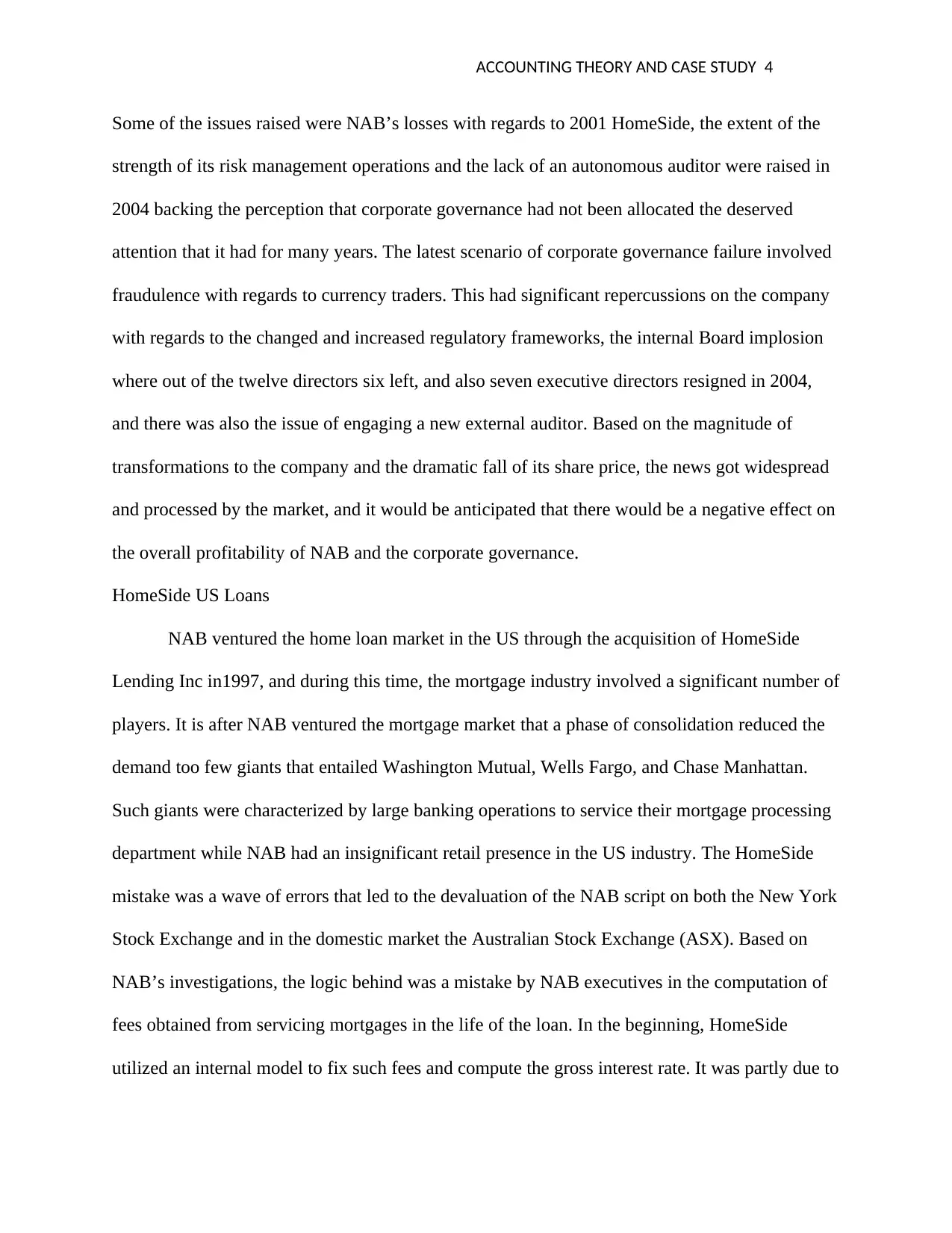
ACCOUNTING THEORY AND CASE STUDY 4
Some of the issues raised were NAB’s losses with regards to 2001 HomeSide, the extent of the
strength of its risk management operations and the lack of an autonomous auditor were raised in
2004 backing the perception that corporate governance had not been allocated the deserved
attention that it had for many years. The latest scenario of corporate governance failure involved
fraudulence with regards to currency traders. This had significant repercussions on the company
with regards to the changed and increased regulatory frameworks, the internal Board implosion
where out of the twelve directors six left, and also seven executive directors resigned in 2004,
and there was also the issue of engaging a new external auditor. Based on the magnitude of
transformations to the company and the dramatic fall of its share price, the news got widespread
and processed by the market, and it would be anticipated that there would be a negative effect on
the overall profitability of NAB and the corporate governance.
HomeSide US Loans
NAB ventured the home loan market in the US through the acquisition of HomeSide
Lending Inc in1997, and during this time, the mortgage industry involved a significant number of
players. It is after NAB ventured the mortgage market that a phase of consolidation reduced the
demand too few giants that entailed Washington Mutual, Wells Fargo, and Chase Manhattan.
Such giants were characterized by large banking operations to service their mortgage processing
department while NAB had an insignificant retail presence in the US industry. The HomeSide
mistake was a wave of errors that led to the devaluation of the NAB script on both the New York
Stock Exchange and in the domestic market the Australian Stock Exchange (ASX). Based on
NAB’s investigations, the logic behind was a mistake by NAB executives in the computation of
fees obtained from servicing mortgages in the life of the loan. In the beginning, HomeSide
utilized an internal model to fix such fees and compute the gross interest rate. It was partly due to
Some of the issues raised were NAB’s losses with regards to 2001 HomeSide, the extent of the
strength of its risk management operations and the lack of an autonomous auditor were raised in
2004 backing the perception that corporate governance had not been allocated the deserved
attention that it had for many years. The latest scenario of corporate governance failure involved
fraudulence with regards to currency traders. This had significant repercussions on the company
with regards to the changed and increased regulatory frameworks, the internal Board implosion
where out of the twelve directors six left, and also seven executive directors resigned in 2004,
and there was also the issue of engaging a new external auditor. Based on the magnitude of
transformations to the company and the dramatic fall of its share price, the news got widespread
and processed by the market, and it would be anticipated that there would be a negative effect on
the overall profitability of NAB and the corporate governance.
HomeSide US Loans
NAB ventured the home loan market in the US through the acquisition of HomeSide
Lending Inc in1997, and during this time, the mortgage industry involved a significant number of
players. It is after NAB ventured the mortgage market that a phase of consolidation reduced the
demand too few giants that entailed Washington Mutual, Wells Fargo, and Chase Manhattan.
Such giants were characterized by large banking operations to service their mortgage processing
department while NAB had an insignificant retail presence in the US industry. The HomeSide
mistake was a wave of errors that led to the devaluation of the NAB script on both the New York
Stock Exchange and in the domestic market the Australian Stock Exchange (ASX). Based on
NAB’s investigations, the logic behind was a mistake by NAB executives in the computation of
fees obtained from servicing mortgages in the life of the loan. In the beginning, HomeSide
utilized an internal model to fix such fees and compute the gross interest rate. It was partly due to
Paraphrase This Document
Need a fresh take? Get an instant paraphrase of this document with our AI Paraphraser
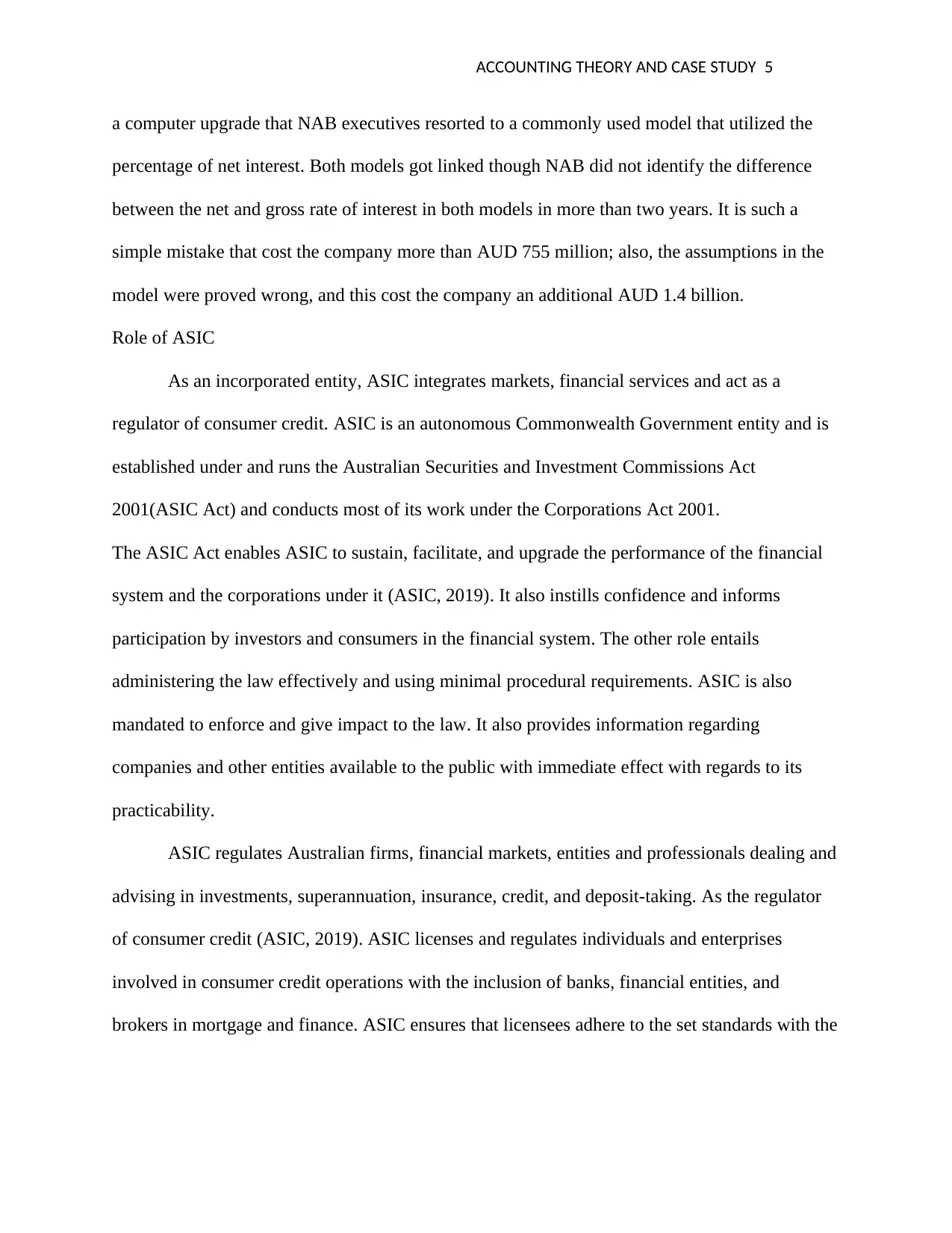
ACCOUNTING THEORY AND CASE STUDY 5
a computer upgrade that NAB executives resorted to a commonly used model that utilized the
percentage of net interest. Both models got linked though NAB did not identify the difference
between the net and gross rate of interest in both models in more than two years. It is such a
simple mistake that cost the company more than AUD 755 million; also, the assumptions in the
model were proved wrong, and this cost the company an additional AUD 1.4 billion.
Role of ASIC
As an incorporated entity, ASIC integrates markets, financial services and act as a
regulator of consumer credit. ASIC is an autonomous Commonwealth Government entity and is
established under and runs the Australian Securities and Investment Commissions Act
2001(ASIC Act) and conducts most of its work under the Corporations Act 2001.
The ASIC Act enables ASIC to sustain, facilitate, and upgrade the performance of the financial
system and the corporations under it (ASIC, 2019). It also instills confidence and informs
participation by investors and consumers in the financial system. The other role entails
administering the law effectively and using minimal procedural requirements. ASIC is also
mandated to enforce and give impact to the law. It also provides information regarding
companies and other entities available to the public with immediate effect with regards to its
practicability.
ASIC regulates Australian firms, financial markets, entities and professionals dealing and
advising in investments, superannuation, insurance, credit, and deposit-taking. As the regulator
of consumer credit (ASIC, 2019). ASIC licenses and regulates individuals and enterprises
involved in consumer credit operations with the inclusion of banks, financial entities, and
brokers in mortgage and finance. ASIC ensures that licensees adhere to the set standards with the
a computer upgrade that NAB executives resorted to a commonly used model that utilized the
percentage of net interest. Both models got linked though NAB did not identify the difference
between the net and gross rate of interest in both models in more than two years. It is such a
simple mistake that cost the company more than AUD 755 million; also, the assumptions in the
model were proved wrong, and this cost the company an additional AUD 1.4 billion.
Role of ASIC
As an incorporated entity, ASIC integrates markets, financial services and act as a
regulator of consumer credit. ASIC is an autonomous Commonwealth Government entity and is
established under and runs the Australian Securities and Investment Commissions Act
2001(ASIC Act) and conducts most of its work under the Corporations Act 2001.
The ASIC Act enables ASIC to sustain, facilitate, and upgrade the performance of the financial
system and the corporations under it (ASIC, 2019). It also instills confidence and informs
participation by investors and consumers in the financial system. The other role entails
administering the law effectively and using minimal procedural requirements. ASIC is also
mandated to enforce and give impact to the law. It also provides information regarding
companies and other entities available to the public with immediate effect with regards to its
practicability.
ASIC regulates Australian firms, financial markets, entities and professionals dealing and
advising in investments, superannuation, insurance, credit, and deposit-taking. As the regulator
of consumer credit (ASIC, 2019). ASIC licenses and regulates individuals and enterprises
involved in consumer credit operations with the inclusion of banks, financial entities, and
brokers in mortgage and finance. ASIC ensures that licensees adhere to the set standards with the
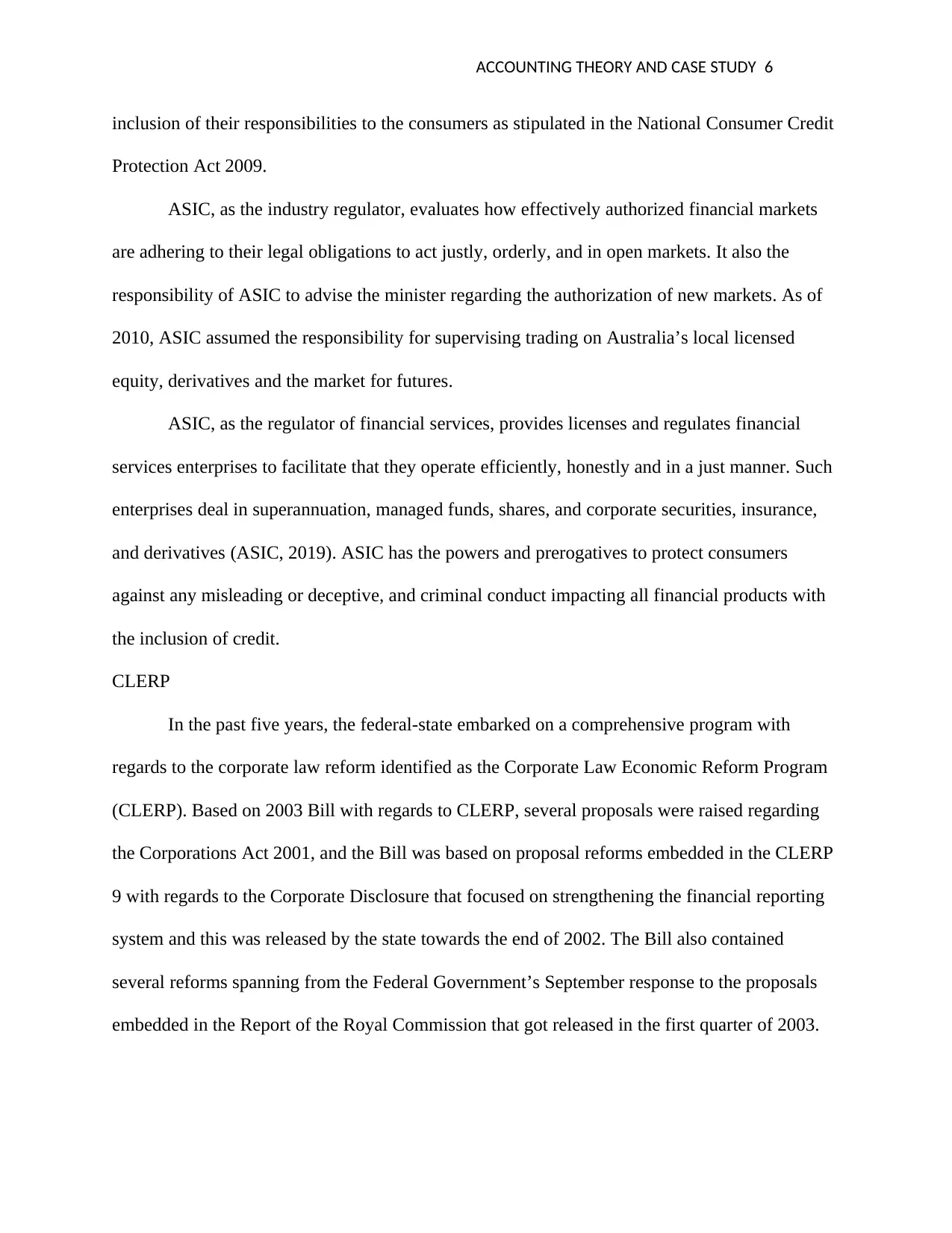
ACCOUNTING THEORY AND CASE STUDY 6
inclusion of their responsibilities to the consumers as stipulated in the National Consumer Credit
Protection Act 2009.
ASIC, as the industry regulator, evaluates how effectively authorized financial markets
are adhering to their legal obligations to act justly, orderly, and in open markets. It also the
responsibility of ASIC to advise the minister regarding the authorization of new markets. As of
2010, ASIC assumed the responsibility for supervising trading on Australia’s local licensed
equity, derivatives and the market for futures.
ASIC, as the regulator of financial services, provides licenses and regulates financial
services enterprises to facilitate that they operate efficiently, honestly and in a just manner. Such
enterprises deal in superannuation, managed funds, shares, and corporate securities, insurance,
and derivatives (ASIC, 2019). ASIC has the powers and prerogatives to protect consumers
against any misleading or deceptive, and criminal conduct impacting all financial products with
the inclusion of credit.
CLERP
In the past five years, the federal-state embarked on a comprehensive program with
regards to the corporate law reform identified as the Corporate Law Economic Reform Program
(CLERP). Based on 2003 Bill with regards to CLERP, several proposals were raised regarding
the Corporations Act 2001, and the Bill was based on proposal reforms embedded in the CLERP
9 with regards to the Corporate Disclosure that focused on strengthening the financial reporting
system and this was released by the state towards the end of 2002. The Bill also contained
several reforms spanning from the Federal Government’s September response to the proposals
embedded in the Report of the Royal Commission that got released in the first quarter of 2003.
inclusion of their responsibilities to the consumers as stipulated in the National Consumer Credit
Protection Act 2009.
ASIC, as the industry regulator, evaluates how effectively authorized financial markets
are adhering to their legal obligations to act justly, orderly, and in open markets. It also the
responsibility of ASIC to advise the minister regarding the authorization of new markets. As of
2010, ASIC assumed the responsibility for supervising trading on Australia’s local licensed
equity, derivatives and the market for futures.
ASIC, as the regulator of financial services, provides licenses and regulates financial
services enterprises to facilitate that they operate efficiently, honestly and in a just manner. Such
enterprises deal in superannuation, managed funds, shares, and corporate securities, insurance,
and derivatives (ASIC, 2019). ASIC has the powers and prerogatives to protect consumers
against any misleading or deceptive, and criminal conduct impacting all financial products with
the inclusion of credit.
CLERP
In the past five years, the federal-state embarked on a comprehensive program with
regards to the corporate law reform identified as the Corporate Law Economic Reform Program
(CLERP). Based on 2003 Bill with regards to CLERP, several proposals were raised regarding
the Corporations Act 2001, and the Bill was based on proposal reforms embedded in the CLERP
9 with regards to the Corporate Disclosure that focused on strengthening the financial reporting
system and this was released by the state towards the end of 2002. The Bill also contained
several reforms spanning from the Federal Government’s September response to the proposals
embedded in the Report of the Royal Commission that got released in the first quarter of 2003.
⊘ This is a preview!⊘
Do you want full access?
Subscribe today to unlock all pages.

Trusted by 1+ million students worldwide
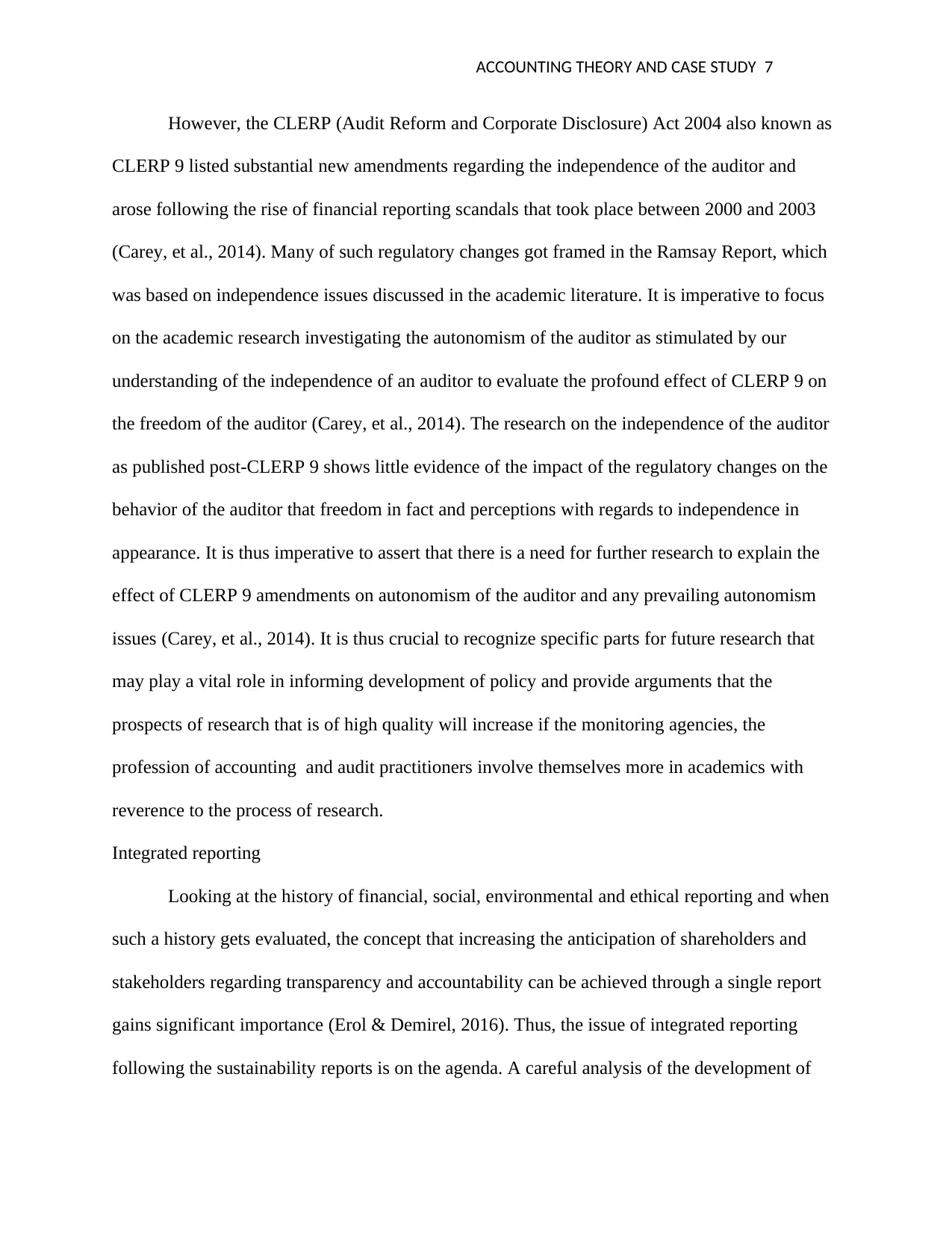
ACCOUNTING THEORY AND CASE STUDY 7
However, the CLERP (Audit Reform and Corporate Disclosure) Act 2004 also known as
CLERP 9 listed substantial new amendments regarding the independence of the auditor and
arose following the rise of financial reporting scandals that took place between 2000 and 2003
(Carey, et al., 2014). Many of such regulatory changes got framed in the Ramsay Report, which
was based on independence issues discussed in the academic literature. It is imperative to focus
on the academic research investigating the autonomism of the auditor as stimulated by our
understanding of the independence of an auditor to evaluate the profound effect of CLERP 9 on
the freedom of the auditor (Carey, et al., 2014). The research on the independence of the auditor
as published post-CLERP 9 shows little evidence of the impact of the regulatory changes on the
behavior of the auditor that freedom in fact and perceptions with regards to independence in
appearance. It is thus imperative to assert that there is a need for further research to explain the
effect of CLERP 9 amendments on autonomism of the auditor and any prevailing autonomism
issues (Carey, et al., 2014). It is thus crucial to recognize specific parts for future research that
may play a vital role in informing development of policy and provide arguments that the
prospects of research that is of high quality will increase if the monitoring agencies, the
profession of accounting and audit practitioners involve themselves more in academics with
reverence to the process of research.
Integrated reporting
Looking at the history of financial, social, environmental and ethical reporting and when
such a history gets evaluated, the concept that increasing the anticipation of shareholders and
stakeholders regarding transparency and accountability can be achieved through a single report
gains significant importance (Erol & Demirel, 2016). Thus, the issue of integrated reporting
following the sustainability reports is on the agenda. A careful analysis of the development of
However, the CLERP (Audit Reform and Corporate Disclosure) Act 2004 also known as
CLERP 9 listed substantial new amendments regarding the independence of the auditor and
arose following the rise of financial reporting scandals that took place between 2000 and 2003
(Carey, et al., 2014). Many of such regulatory changes got framed in the Ramsay Report, which
was based on independence issues discussed in the academic literature. It is imperative to focus
on the academic research investigating the autonomism of the auditor as stimulated by our
understanding of the independence of an auditor to evaluate the profound effect of CLERP 9 on
the freedom of the auditor (Carey, et al., 2014). The research on the independence of the auditor
as published post-CLERP 9 shows little evidence of the impact of the regulatory changes on the
behavior of the auditor that freedom in fact and perceptions with regards to independence in
appearance. It is thus imperative to assert that there is a need for further research to explain the
effect of CLERP 9 amendments on autonomism of the auditor and any prevailing autonomism
issues (Carey, et al., 2014). It is thus crucial to recognize specific parts for future research that
may play a vital role in informing development of policy and provide arguments that the
prospects of research that is of high quality will increase if the monitoring agencies, the
profession of accounting and audit practitioners involve themselves more in academics with
reverence to the process of research.
Integrated reporting
Looking at the history of financial, social, environmental and ethical reporting and when
such a history gets evaluated, the concept that increasing the anticipation of shareholders and
stakeholders regarding transparency and accountability can be achieved through a single report
gains significant importance (Erol & Demirel, 2016). Thus, the issue of integrated reporting
following the sustainability reports is on the agenda. A careful analysis of the development of
Paraphrase This Document
Need a fresh take? Get an instant paraphrase of this document with our AI Paraphraser
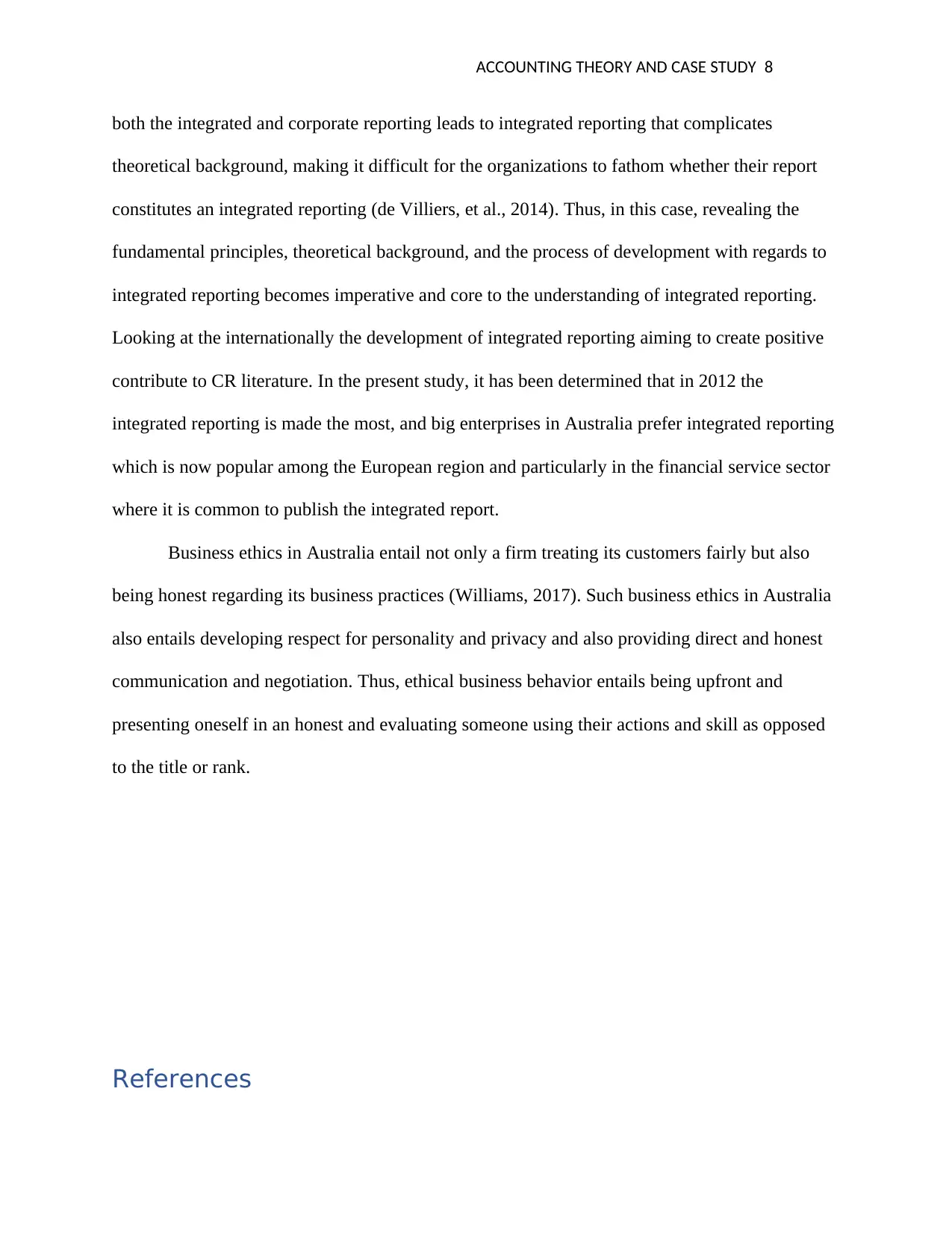
ACCOUNTING THEORY AND CASE STUDY 8
both the integrated and corporate reporting leads to integrated reporting that complicates
theoretical background, making it difficult for the organizations to fathom whether their report
constitutes an integrated reporting (de Villiers, et al., 2014). Thus, in this case, revealing the
fundamental principles, theoretical background, and the process of development with regards to
integrated reporting becomes imperative and core to the understanding of integrated reporting.
Looking at the internationally the development of integrated reporting aiming to create positive
contribute to CR literature. In the present study, it has been determined that in 2012 the
integrated reporting is made the most, and big enterprises in Australia prefer integrated reporting
which is now popular among the European region and particularly in the financial service sector
where it is common to publish the integrated report.
Business ethics in Australia entail not only a firm treating its customers fairly but also
being honest regarding its business practices (Williams, 2017). Such business ethics in Australia
also entails developing respect for personality and privacy and also providing direct and honest
communication and negotiation. Thus, ethical business behavior entails being upfront and
presenting oneself in an honest and evaluating someone using their actions and skill as opposed
to the title or rank.
References
both the integrated and corporate reporting leads to integrated reporting that complicates
theoretical background, making it difficult for the organizations to fathom whether their report
constitutes an integrated reporting (de Villiers, et al., 2014). Thus, in this case, revealing the
fundamental principles, theoretical background, and the process of development with regards to
integrated reporting becomes imperative and core to the understanding of integrated reporting.
Looking at the internationally the development of integrated reporting aiming to create positive
contribute to CR literature. In the present study, it has been determined that in 2012 the
integrated reporting is made the most, and big enterprises in Australia prefer integrated reporting
which is now popular among the European region and particularly in the financial service sector
where it is common to publish the integrated report.
Business ethics in Australia entail not only a firm treating its customers fairly but also
being honest regarding its business practices (Williams, 2017). Such business ethics in Australia
also entails developing respect for personality and privacy and also providing direct and honest
communication and negotiation. Thus, ethical business behavior entails being upfront and
presenting oneself in an honest and evaluating someone using their actions and skill as opposed
to the title or rank.
References
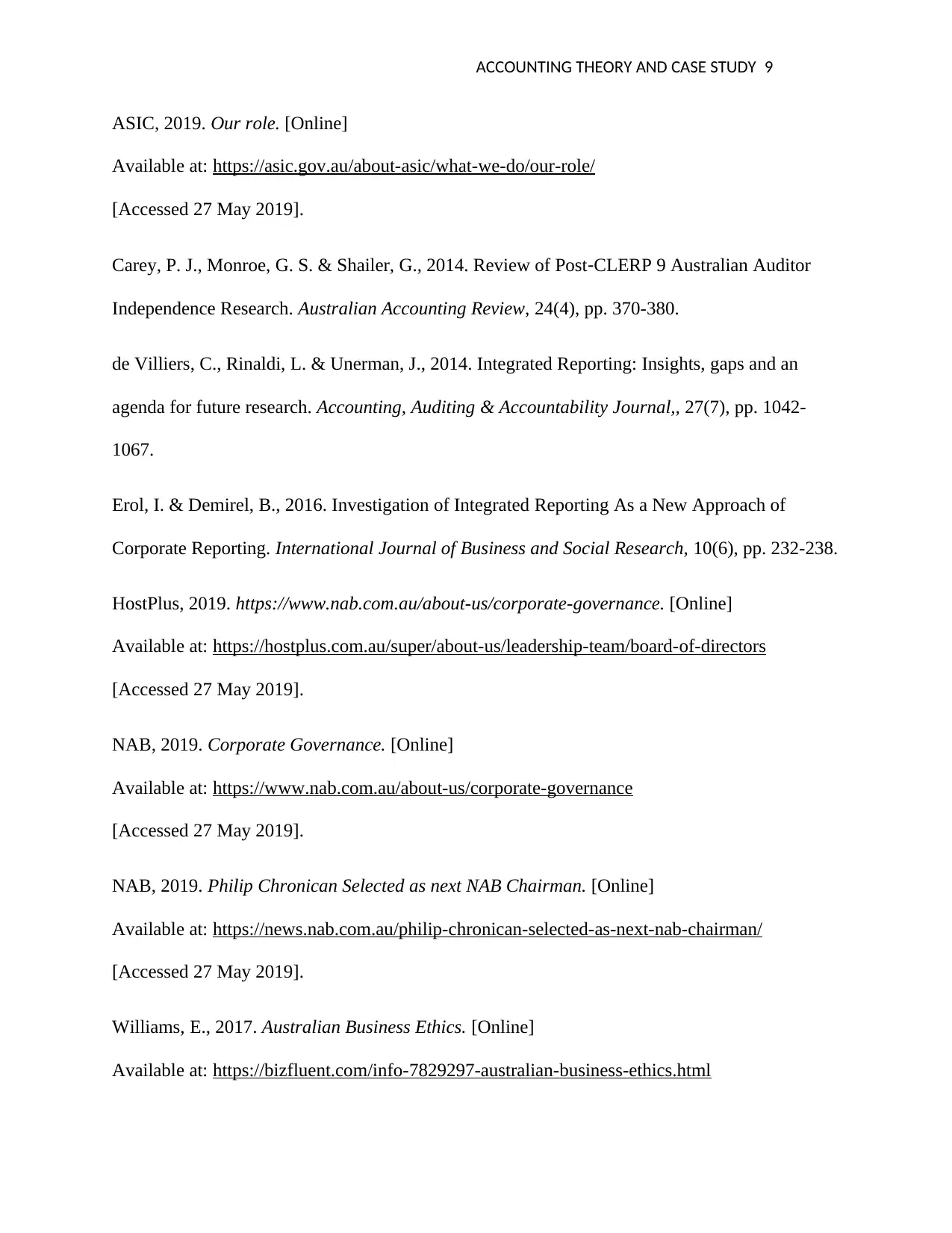
ACCOUNTING THEORY AND CASE STUDY 9
ASIC, 2019. Our role. [Online]
Available at: https://asic.gov.au/about-asic/what-we-do/our-role/
[Accessed 27 May 2019].
Carey, P. J., Monroe, G. S. & Shailer, G., 2014. Review of Post‐CLERP 9 Australian Auditor
Independence Research. Australian Accounting Review, 24(4), pp. 370-380.
de Villiers, C., Rinaldi, L. & Unerman, J., 2014. Integrated Reporting: Insights, gaps and an
agenda for future research. Accounting, Auditing & Accountability Journal,, 27(7), pp. 1042-
1067.
Erol, I. & Demirel, B., 2016. Investigation of Integrated Reporting As a New Approach of
Corporate Reporting. International Journal of Business and Social Research, 10(6), pp. 232-238.
HostPlus, 2019. https://www.nab.com.au/about-us/corporate-governance. [Online]
Available at: https://hostplus.com.au/super/about-us/leadership-team/board-of-directors
[Accessed 27 May 2019].
NAB, 2019. Corporate Governance. [Online]
Available at: https://www.nab.com.au/about-us/corporate-governance
[Accessed 27 May 2019].
NAB, 2019. Philip Chronican Selected as next NAB Chairman. [Online]
Available at: https://news.nab.com.au/philip-chronican-selected-as-next-nab-chairman/
[Accessed 27 May 2019].
Williams, E., 2017. Australian Business Ethics. [Online]
Available at: https://bizfluent.com/info-7829297-australian-business-ethics.html
ASIC, 2019. Our role. [Online]
Available at: https://asic.gov.au/about-asic/what-we-do/our-role/
[Accessed 27 May 2019].
Carey, P. J., Monroe, G. S. & Shailer, G., 2014. Review of Post‐CLERP 9 Australian Auditor
Independence Research. Australian Accounting Review, 24(4), pp. 370-380.
de Villiers, C., Rinaldi, L. & Unerman, J., 2014. Integrated Reporting: Insights, gaps and an
agenda for future research. Accounting, Auditing & Accountability Journal,, 27(7), pp. 1042-
1067.
Erol, I. & Demirel, B., 2016. Investigation of Integrated Reporting As a New Approach of
Corporate Reporting. International Journal of Business and Social Research, 10(6), pp. 232-238.
HostPlus, 2019. https://www.nab.com.au/about-us/corporate-governance. [Online]
Available at: https://hostplus.com.au/super/about-us/leadership-team/board-of-directors
[Accessed 27 May 2019].
NAB, 2019. Corporate Governance. [Online]
Available at: https://www.nab.com.au/about-us/corporate-governance
[Accessed 27 May 2019].
NAB, 2019. Philip Chronican Selected as next NAB Chairman. [Online]
Available at: https://news.nab.com.au/philip-chronican-selected-as-next-nab-chairman/
[Accessed 27 May 2019].
Williams, E., 2017. Australian Business Ethics. [Online]
Available at: https://bizfluent.com/info-7829297-australian-business-ethics.html
⊘ This is a preview!⊘
Do you want full access?
Subscribe today to unlock all pages.

Trusted by 1+ million students worldwide

ACCOUNTING THEORY AND CASE STUDY 10
[Accessed 27 May 2019].
[Accessed 27 May 2019].
1 out of 10
Related Documents
Your All-in-One AI-Powered Toolkit for Academic Success.
+13062052269
info@desklib.com
Available 24*7 on WhatsApp / Email
![[object Object]](/_next/static/media/star-bottom.7253800d.svg)
Unlock your academic potential
Copyright © 2020–2026 A2Z Services. All Rights Reserved. Developed and managed by ZUCOL.





